

Organic Farming's Economic and Environmental Benefits. Organic farming is a rapidly expanding economic sector and makes an important contribution to human health, the health of the economy, and the health of the planet.

Organic Farming Could Grow Even More Jobs with Better Policy Support. Money can grow on trees, and so can jobs -- if those trees are organic.

That's the finding of a new report calling for new federal policies to support organic agriculture in next year's Farm Bill and beyond. Organic agriculture can have a strong positive impact on the U.S. economy and is good for job creation, says a new study by Organic Farming Research Foundation (OFRF). But with additional policy help from the federal government the sector can make the most of its economic and environmental potential is a good investment for the nation as a whole, said OFRF external relations director Denise Ryan.
Pesticides On Food. Organic Agriculture Can Feed the World - Regeneration International. Which states have the most organic farms? There were more than 14,000 certified organic farms in the United States in 2016, according to the latest available data from the U.S.
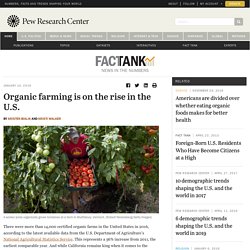
Department of Agriculture’s National Agricultural Statistics Service. This represents a 56% increase from 2011, the earliest comparable year. And while California remains king when it comes to the number of organic farms, several other states saw dramatic growth in organic farming over this time, particularly in the South. As the number of organic farms has increased, so too have sales of certified organic products: U.S. farms and ranches sold nearly $7.6 billion in certified organic goods in 2016, more than double the $3.5 billion in sales in 2011. Still, organic farming makes up a small share of U.S. farmland overall. 5 reasons why we support Organic Farming. 4.
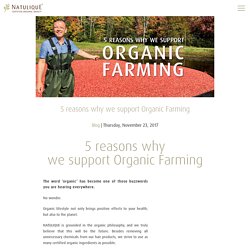
Organic farming 'benefits biodiversity' Image copyright SPL Organic farms act as a refuge for wild plants, offsetting the loss of biodiversity on conventional farms, a study suggests.

Fields around organic farms have more types of wild plants, providing benefits for wildlife, say scientists. 3 Big Myths about Modern Agriculture. The following essay is reprinted with permission from The Conversation, an online publication covering the latest research.
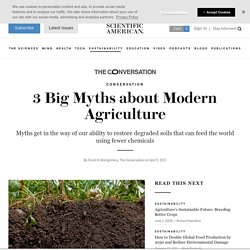
One of the biggest modern myths about agriculture is that organic farming is inherently sustainable. It can be, but it isn’t necessarily. After all, soil erosion from chemical-free tilled fields undermined the Roman Empire and other ancient societies around the world. Other agricultural myths hinder recognizing the potential to restore degraded soils to feed the world using fewer agrochemicals. When I embarked on a six-month trip to visit farms around the world to research my forthcoming book, “Growing a Revolution: Bringing Our Soil Back to Life,” the innovative farmers I met showed me that regenerative farming practices can restore the world’s agricultural soils.
Myth 1: Large-scale agriculture feeds the world today According to a recent U.N. Only about 1 percent of Americans are farmers today. Agropro Monitor. Engaging Youth in Agricultural Extension and Advisory Services. This blog is written by Kristin Davis, IFPRI, and Steven Franzel, ICRAF We said in an earlier post this month that we can’t talk about the future without mentioning youth.

But what do youth (defined by the UN as ages 15-24 and the AU as ages 15-35) have to do with agriculture or agricultural extension? Aren’t most young people trying to get out of rural areas and are not interested in agriculture? Well, it’s not actually true that youth are not interested in agriculture. They are interested in rewarding careers, exciting technology, and earning incomes – and guess what, these do exist in agriculture (and extension). For those of us working in extension and advisory services, the rising youth population seems to present a challenge: the growing pressure for countries to create economic opportunities for this growing segment of the population. The diagnostic studies by DLEC showed a number of key points. Agrilinks. Studies — Nature's Wonder® We firmly believe in proof of concept through University studies and real world applications to clearly demonstrate the positive impacts Nature's Wonder® APEX-10™ offers users.
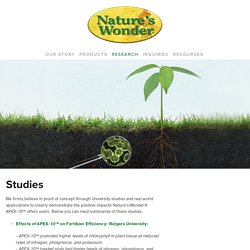
Below you can read summaries of those studies. Effects of APEX-10™ on Fertilizer Efficiency- Rutgers University: - APEX-10™ promotes higher levels of chlorophyll in plant tissue at reduced rates of nitrogen, phosphorus, and potassium.- APEX-10™ treated plots had higher levels of nitrogen, phosphorus, and potassium in the leaf tissue. Effects of APEX-10 on Reducing Irrigation Requirements in Turfgrass - Rutgers University: - APEX-10™ promotes significantly better drought tolerance and post-drought recovery when compared to turf not treated with APEX-10™.- Turf quality of both bluegrass and bent grass improve to a far greater degree during times of water deficit due to increase in root & shoot production of APEX-10™ treated plots. Enhancing Plant Productivity During Drought Conditions - Virginia Tech: 1.what.is.fulvic. 10 Important Benefits of Fulvic Acid - Microbe Formulas™
Fulvic acid is a super-nutrient that literally comes from the dirt.
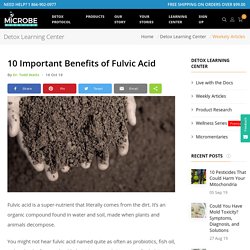
It’s an organic compound found in water and soil, made when plants and animals decompose. You might not hear fulvic acid named quite as often as probiotics, fish oil, or kombucha for your health, but it’s extremely important for helping to boost the effectiveness of the immune system, aid digestion, detox, and protect your overall health.
Because we’ve depleted our soils (through pesticides, herbicides, and reusing the dirt for multiple crops without replenishing organic nutrients), our bodies are lacking the fulvic and humic acids they need for optimal health. Farmers used to reintroduce compost and organic compounds to the soil after a round of crops, in addition to rotating crops to ensure nutrients were getting back into the soil. This is more sustainable, better for the environment, and better for those consuming the crops grown. Now, with commercialized farming, there’s no time to let the soil rest between crops. 10 Important Benefits of Fulvic Acid - Microbe Formulas™